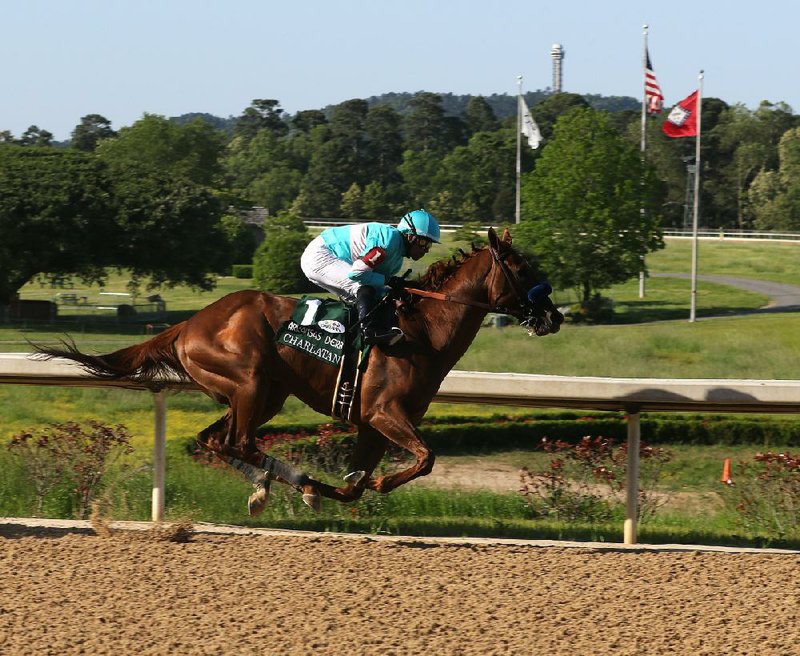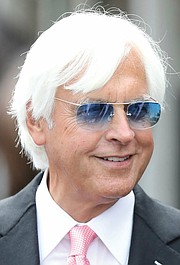Two horses trained by Hall of Famer Bob Baffert tested positive for a banned substance at a recently concluded meet at Oaklawn Racing Casino Resort in Arkansas, according to a person familiar with the testing process.
One of the horses, Charlatan, won a division of the Arkansas Derby on May 2 and was considered a top contender to win the Belmont Stakes on June 20.
The undefeated Charlatan -- as well as his stablemate Gamine, who also won on the May 2 racing card -- tested positive for lidocaine, a local numbing agent, according to the person who spoke Tuesday on the condition of anonymity because the case had not been fully adjudicated.
The anesthetic is considered a Class 2 drug by the Association of Racing Commissioners International, and use of it carries a penalty of a 15- to 60-day suspension and a fine of $500 to $1,000 for a first offense. In the absence of mitigating circumstances, the horse also would be disqualified and forfeit the purse. Charlatan earned $300,000 for first place.
It is unclear how the case will affect his eligibility for the Belmont Stakes, which will be the first leg of the Triple Crown this year because of rescheduling related to the coronavirus pandemic. Based on his win at Oaklawn, Charlatan is ranked fourth on the qualifying-points list for the Kentucky Derby, the traditional first leg of the Triple Crown, which is now scheduled for Sept. 5.
Baffert has exercised his right to have a second test run on the samples, which can take a week or longer. Baffert did not return phone calls, texts or emails from The New York Times.
Jack Wolfe, the managing partner of Starlight Stables, which co-owns the colt, declined to comment and referred questions to Baffert. Four days after Charlatan's runaway victory in the $500,000 Arkansas Derby, the colt's stallion rights were sold for an undisclosed sum to Hill 'n' Dale Farm.
Lidocaine can be used legitimately for suturing wounds or as a diagnostic tool to determine whether horses are sound enough to compete. The drug may also be present in ointments or creams used on cuts or abrasions. It is regulated because of its potential to mask lameness in an unsound horse.
"Nothing has come before the commission yet -- we do not have the facts," Alex Lieblong, the chairman of the Arkansas Racing Commission, said. "When we get it, there will be no delaying tactics. Anything we can expedite, we will do."
Louis Cella, the owner and president of Oaklawn, said the commission was "grabbing the bull by the horns."
"We will not have a situation like in California, where a horse ran in the Kentucky Derby after failing a drug test," said Cella, referring to a test failed by Justify, the 2018 Triple Crown winner. "That was an embarrassment to the industry. We will push to have this cleared up by the Belmont Stakes."
Last year, The New York Times reported that Justify -- also trained by Baffert -- had failed a drug test after winning the Santa Anita Derby, nearly a month before the Kentucky Derby. The rule on the books at the time required that Justify be disqualified, forfeiting both his prize money and his entry into the Derby.
California racing officials investigated the failed test for four months, allowing Justify to keep competing long enough to win not only the Derby, but also the Preakness and the Belmont Stakes. In August, after Justify's breeding rights had been sold for $60 million, the California Horse Racing Board -- whose chairman at the time, Chuck Winner, had employed Baffert to train his horses -- disposed of the inquiry during a rare closed-door session.
The board ruled that Justify's positive test for the banned drug scopolamine had been the result of "environmental contamination," not intentional doping. Baffert has denied any wrongdoing, but the quantity of the drug found in Justify suggested it was present not because of contamination in his feed or his bedding but rather because of an effort to enhance performance, according to Dr. Rick Sams, who ran the drug lab for the Kentucky Horse Racing Commission from 2011-18.
Sports on 05/27/2020

